Corporations Law: Authority of Agents, Turquand Rule and Exceptions
VerifiedAdded on 2022/08/22
|12
|2278
|13
Report
AI Summary
This report provides a comprehensive overview of corporations law, focusing on the principles of agency and authority within corporate structures. It explores the concepts of actual and ostensible authority, examining how agents bind corporations in transactions with third parties. The report delves into the Turquand Rule, which protects third parties dealing with companies, and its exceptions. It analyzes relevant case law, including Freeman and Lockyer v Buckhurst Park Properties (Mangal) Ltd and Northside Developments Pty Ltd v Registrar-General, to illustrate these concepts. Furthermore, the report examines the statutory regime outlined in the Corporations Act 2001, specifically sections 126-130, which address the authorities of parties and provide assumptions for third parties. The conclusion emphasizes the importance of understanding the nuances of authority within corporations and the balancing act between protecting companies and third parties. The report also includes a detailed bibliography of legislation, case laws, books, and online resources.
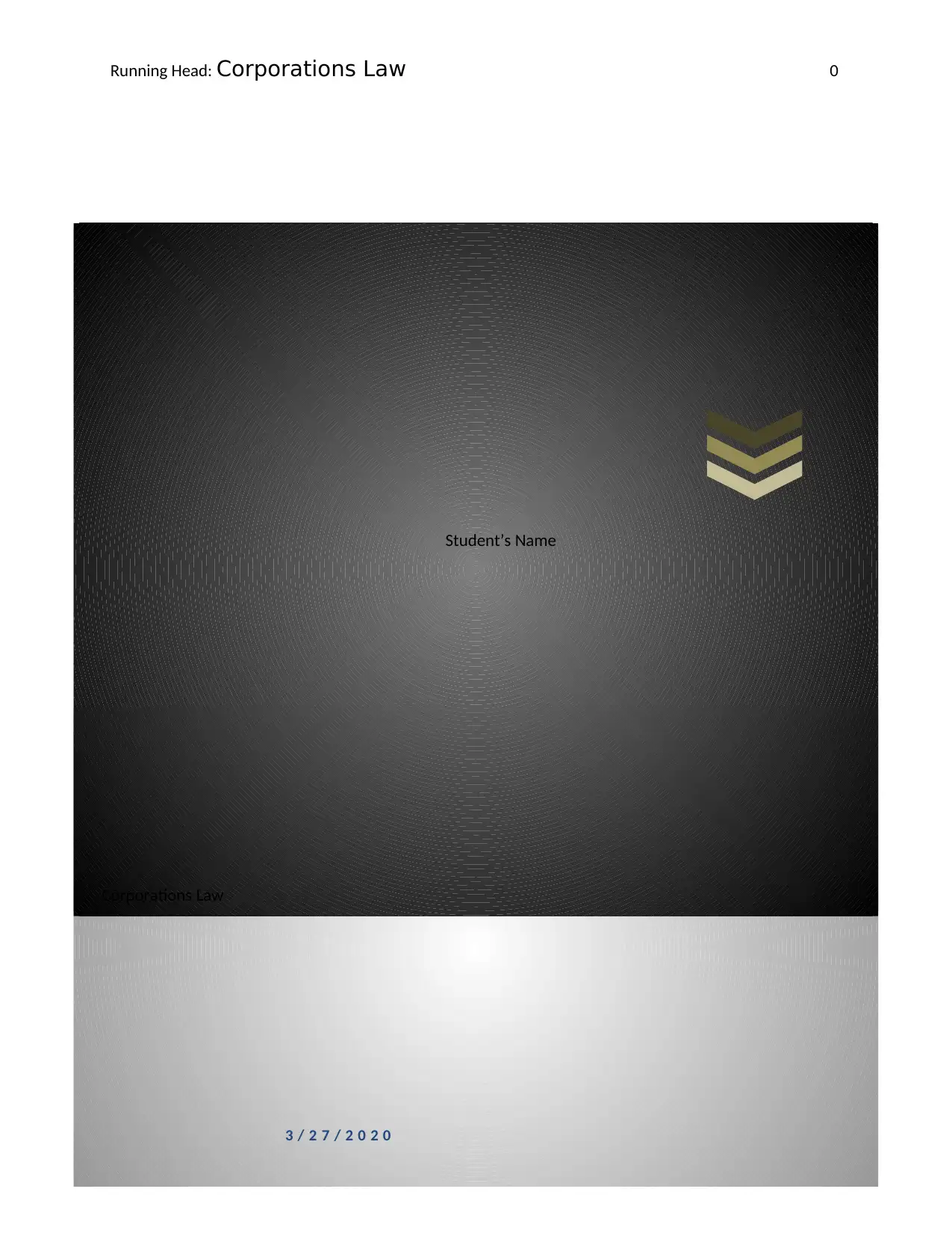
Corporations Law
Running Head: Corporations Law 0
3 / 2 7 / 2 0 2 0
Student’s Name
Running Head: Corporations Law 0
3 / 2 7 / 2 0 2 0
Student’s Name
Paraphrase This Document
Need a fresh take? Get an instant paraphrase of this document with our AI Paraphraser
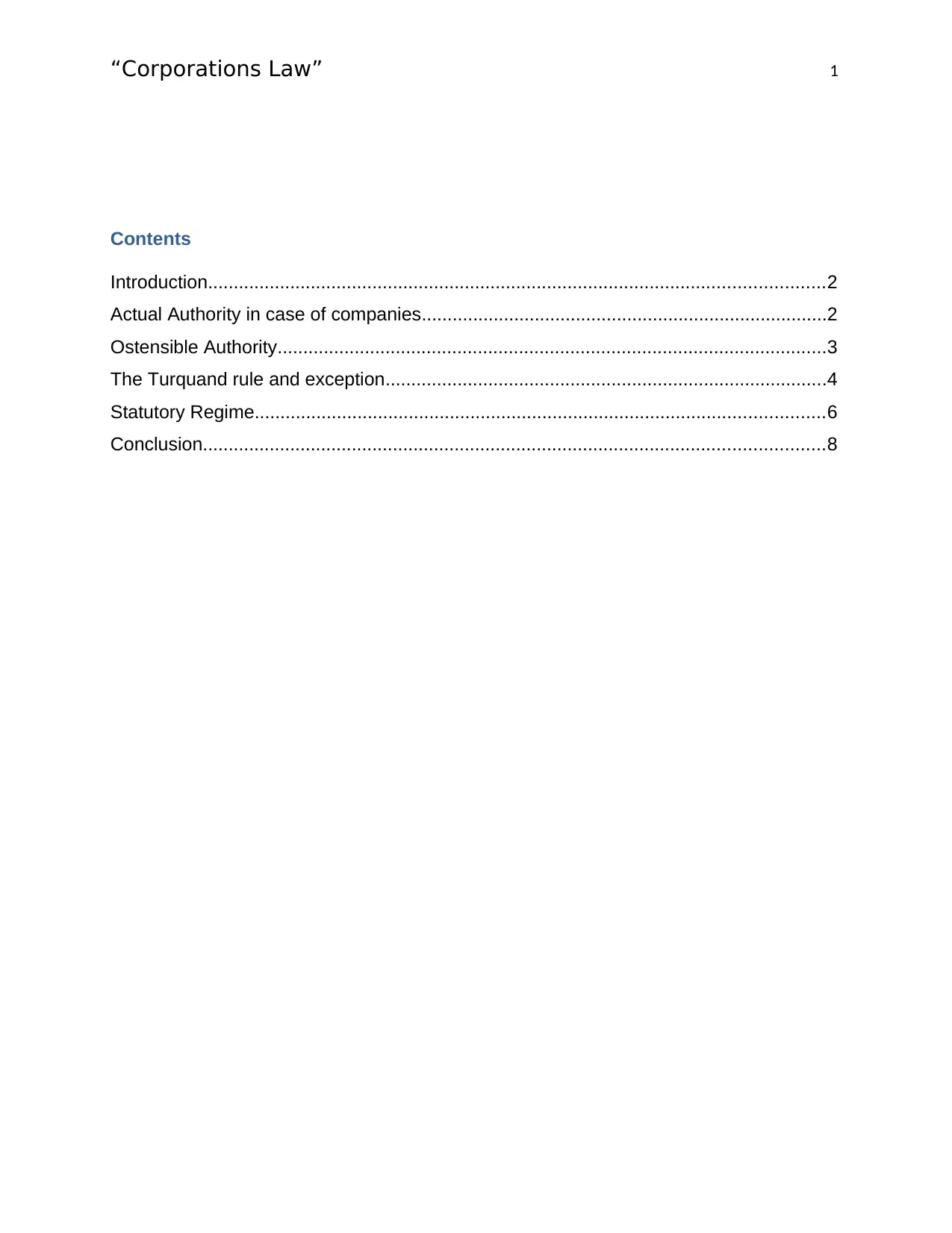
“Corporations Law” 1
Contents
Introduction........................................................................................................................2
Actual Authority in case of companies...............................................................................2
Ostensible Authority...........................................................................................................3
The Turquand rule and exception......................................................................................4
Statutory Regime...............................................................................................................6
Conclusion.........................................................................................................................8
Contents
Introduction........................................................................................................................2
Actual Authority in case of companies...............................................................................2
Ostensible Authority...........................................................................................................3
The Turquand rule and exception......................................................................................4
Statutory Regime...............................................................................................................6
Conclusion.........................................................................................................................8
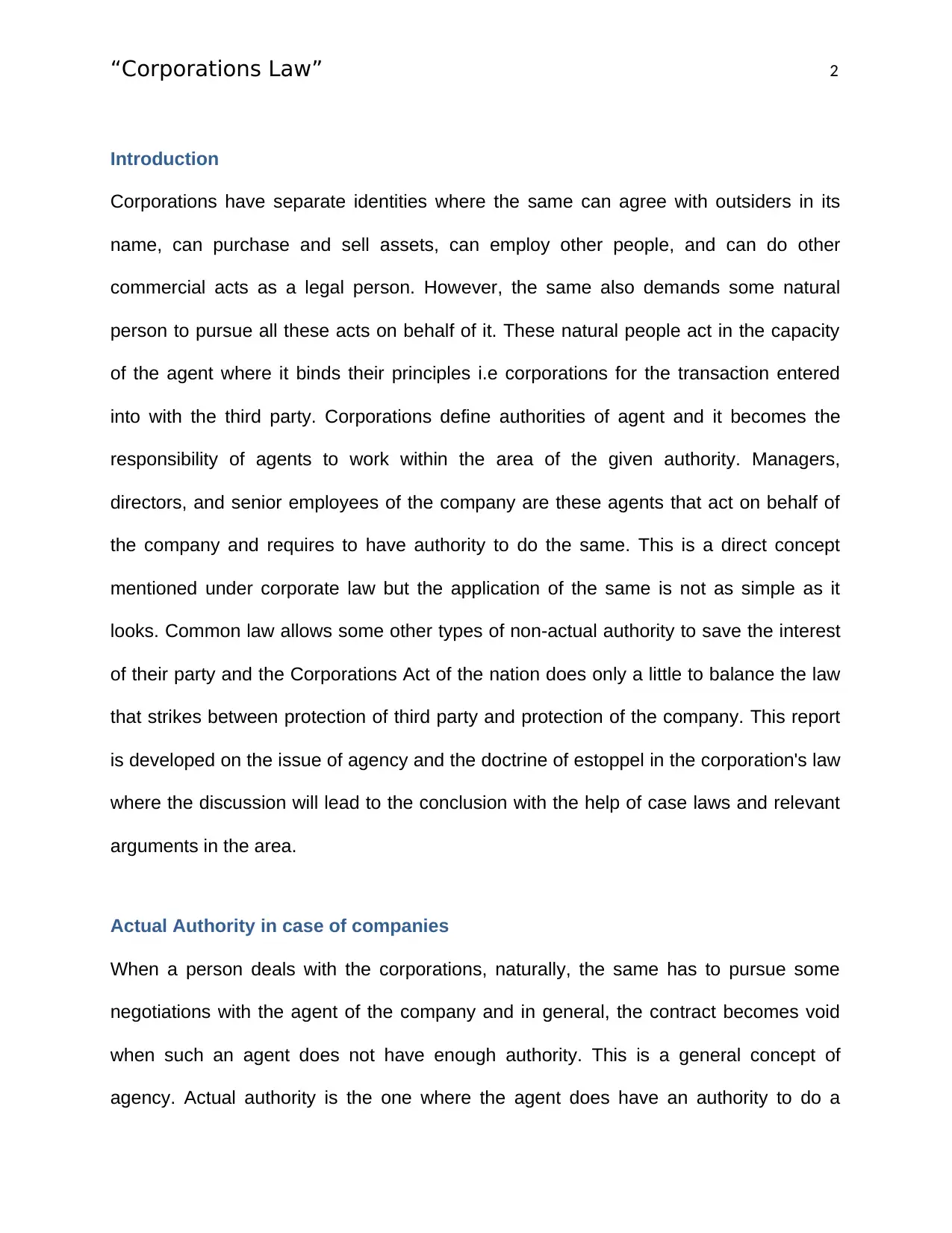
“Corporations Law” 2
Introduction
Corporations have separate identities where the same can agree with outsiders in its
name, can purchase and sell assets, can employ other people, and can do other
commercial acts as a legal person. However, the same also demands some natural
person to pursue all these acts on behalf of it. These natural people act in the capacity
of the agent where it binds their principles i.e corporations for the transaction entered
into with the third party. Corporations define authorities of agent and it becomes the
responsibility of agents to work within the area of the given authority. Managers,
directors, and senior employees of the company are these agents that act on behalf of
the company and requires to have authority to do the same. This is a direct concept
mentioned under corporate law but the application of the same is not as simple as it
looks. Common law allows some other types of non-actual authority to save the interest
of their party and the Corporations Act of the nation does only a little to balance the law
that strikes between protection of third party and protection of the company. This report
is developed on the issue of agency and the doctrine of estoppel in the corporation's law
where the discussion will lead to the conclusion with the help of case laws and relevant
arguments in the area.
Actual Authority in case of companies
When a person deals with the corporations, naturally, the same has to pursue some
negotiations with the agent of the company and in general, the contract becomes void
when such an agent does not have enough authority. This is a general concept of
agency. Actual authority is the one where the agent does have an authority to do a
Introduction
Corporations have separate identities where the same can agree with outsiders in its
name, can purchase and sell assets, can employ other people, and can do other
commercial acts as a legal person. However, the same also demands some natural
person to pursue all these acts on behalf of it. These natural people act in the capacity
of the agent where it binds their principles i.e corporations for the transaction entered
into with the third party. Corporations define authorities of agent and it becomes the
responsibility of agents to work within the area of the given authority. Managers,
directors, and senior employees of the company are these agents that act on behalf of
the company and requires to have authority to do the same. This is a direct concept
mentioned under corporate law but the application of the same is not as simple as it
looks. Common law allows some other types of non-actual authority to save the interest
of their party and the Corporations Act of the nation does only a little to balance the law
that strikes between protection of third party and protection of the company. This report
is developed on the issue of agency and the doctrine of estoppel in the corporation's law
where the discussion will lead to the conclusion with the help of case laws and relevant
arguments in the area.
Actual Authority in case of companies
When a person deals with the corporations, naturally, the same has to pursue some
negotiations with the agent of the company and in general, the contract becomes void
when such an agent does not have enough authority. This is a general concept of
agency. Actual authority is the one where the agent does have an authority to do a
⊘ This is a preview!⊘
Do you want full access?
Subscribe today to unlock all pages.

Trusted by 1+ million students worldwide
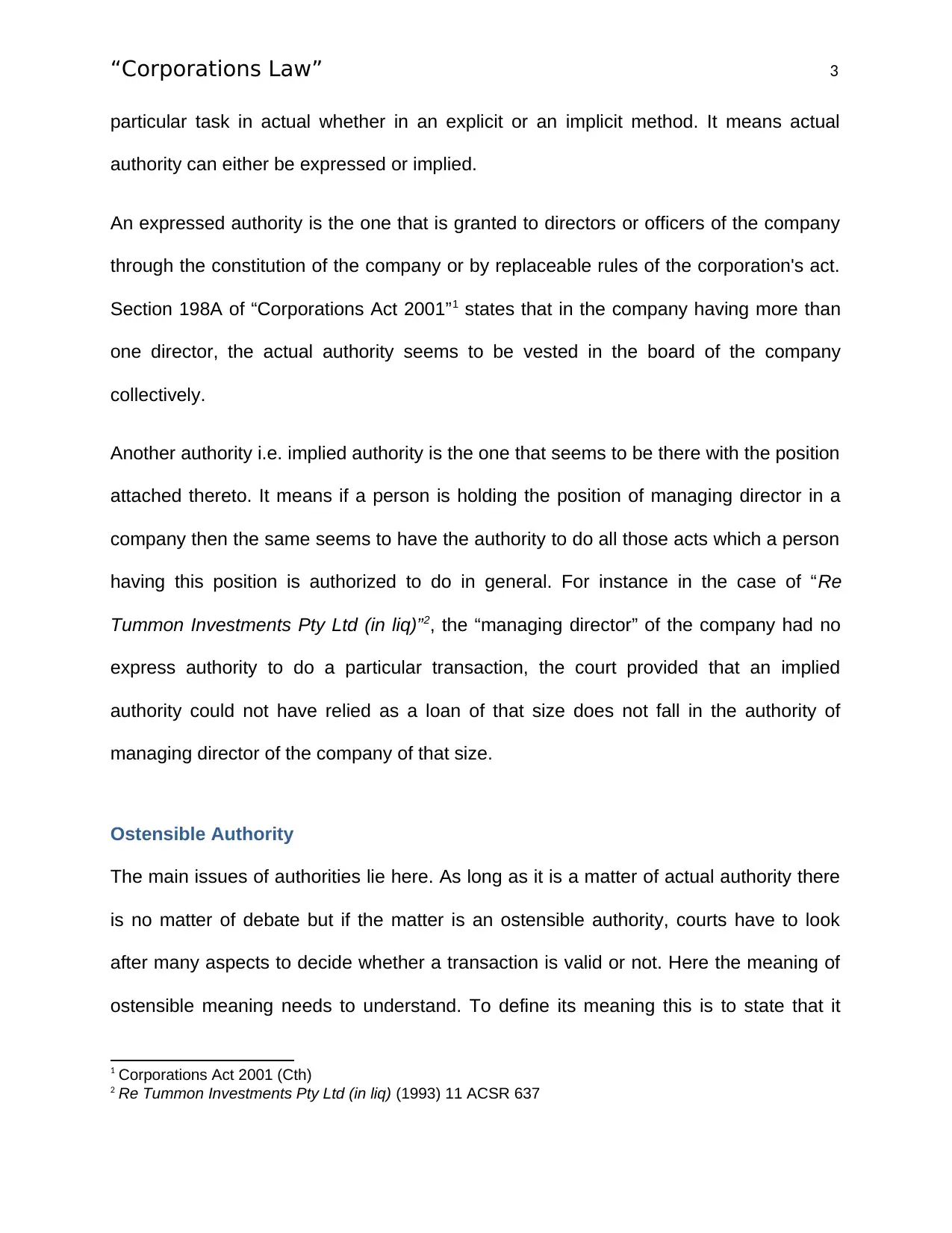
“Corporations Law” 3
particular task in actual whether in an explicit or an implicit method. It means actual
authority can either be expressed or implied.
An expressed authority is the one that is granted to directors or officers of the company
through the constitution of the company or by replaceable rules of the corporation's act.
Section 198A of “Corporations Act 2001”1 states that in the company having more than
one director, the actual authority seems to be vested in the board of the company
collectively.
Another authority i.e. implied authority is the one that seems to be there with the position
attached thereto. It means if a person is holding the position of managing director in a
company then the same seems to have the authority to do all those acts which a person
having this position is authorized to do in general. For instance in the case of “Re
Tummon Investments Pty Ltd (in liq)”2, the “managing director” of the company had no
express authority to do a particular transaction, the court provided that an implied
authority could not have relied as a loan of that size does not fall in the authority of
managing director of the company of that size.
Ostensible Authority
The main issues of authorities lie here. As long as it is a matter of actual authority there
is no matter of debate but if the matter is an ostensible authority, courts have to look
after many aspects to decide whether a transaction is valid or not. Here the meaning of
ostensible meaning needs to understand. To define its meaning this is to state that it
1 Corporations Act 2001 (Cth)
2 Re Tummon Investments Pty Ltd (in liq) (1993) 11 ACSR 637
particular task in actual whether in an explicit or an implicit method. It means actual
authority can either be expressed or implied.
An expressed authority is the one that is granted to directors or officers of the company
through the constitution of the company or by replaceable rules of the corporation's act.
Section 198A of “Corporations Act 2001”1 states that in the company having more than
one director, the actual authority seems to be vested in the board of the company
collectively.
Another authority i.e. implied authority is the one that seems to be there with the position
attached thereto. It means if a person is holding the position of managing director in a
company then the same seems to have the authority to do all those acts which a person
having this position is authorized to do in general. For instance in the case of “Re
Tummon Investments Pty Ltd (in liq)”2, the “managing director” of the company had no
express authority to do a particular transaction, the court provided that an implied
authority could not have relied as a loan of that size does not fall in the authority of
managing director of the company of that size.
Ostensible Authority
The main issues of authorities lie here. As long as it is a matter of actual authority there
is no matter of debate but if the matter is an ostensible authority, courts have to look
after many aspects to decide whether a transaction is valid or not. Here the meaning of
ostensible meaning needs to understand. To define its meaning this is to state that it
1 Corporations Act 2001 (Cth)
2 Re Tummon Investments Pty Ltd (in liq) (1993) 11 ACSR 637
Paraphrase This Document
Need a fresh take? Get an instant paraphrase of this document with our AI Paraphraser
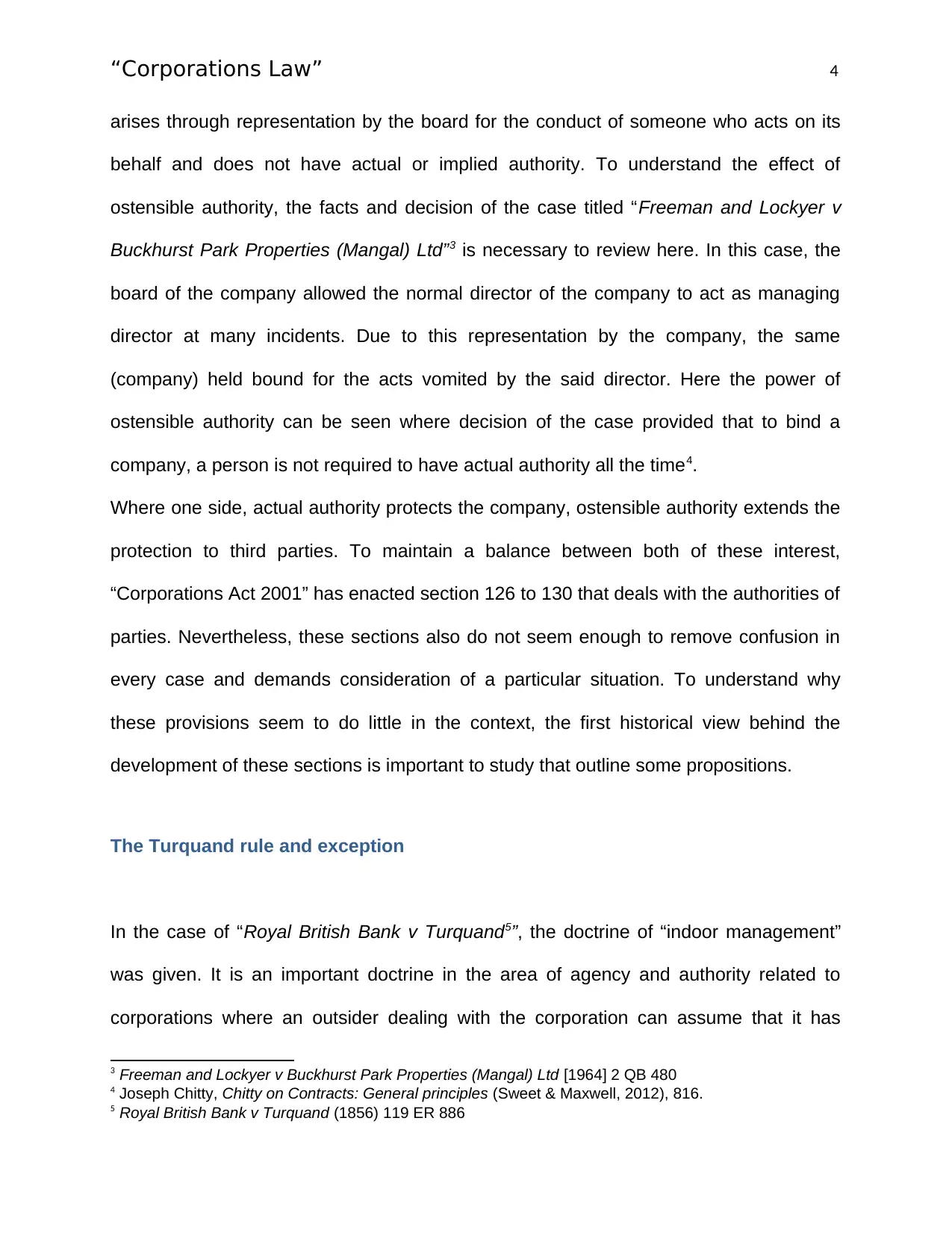
“Corporations Law” 4
arises through representation by the board for the conduct of someone who acts on its
behalf and does not have actual or implied authority. To understand the effect of
ostensible authority, the facts and decision of the case titled “Freeman and Lockyer v
Buckhurst Park Properties (Mangal) Ltd”3 is necessary to review here. In this case, the
board of the company allowed the normal director of the company to act as managing
director at many incidents. Due to this representation by the company, the same
(company) held bound for the acts vomited by the said director. Here the power of
ostensible authority can be seen where decision of the case provided that to bind a
company, a person is not required to have actual authority all the time4.
Where one side, actual authority protects the company, ostensible authority extends the
protection to third parties. To maintain a balance between both of these interest,
“Corporations Act 2001” has enacted section 126 to 130 that deals with the authorities of
parties. Nevertheless, these sections also do not seem enough to remove confusion in
every case and demands consideration of a particular situation. To understand why
these provisions seem to do little in the context, the first historical view behind the
development of these sections is important to study that outline some propositions.
The Turquand rule and exception
In the case of “Royal British Bank v Turquand5”, the doctrine of “indoor management”
was given. It is an important doctrine in the area of agency and authority related to
corporations where an outsider dealing with the corporation can assume that it has
3 Freeman and Lockyer v Buckhurst Park Properties (Mangal) Ltd [1964] 2 QB 480
4 Joseph Chitty, Chitty on Contracts: General principles (Sweet & Maxwell, 2012), 816.
5 Royal British Bank v Turquand (1856) 119 ER 886
arises through representation by the board for the conduct of someone who acts on its
behalf and does not have actual or implied authority. To understand the effect of
ostensible authority, the facts and decision of the case titled “Freeman and Lockyer v
Buckhurst Park Properties (Mangal) Ltd”3 is necessary to review here. In this case, the
board of the company allowed the normal director of the company to act as managing
director at many incidents. Due to this representation by the company, the same
(company) held bound for the acts vomited by the said director. Here the power of
ostensible authority can be seen where decision of the case provided that to bind a
company, a person is not required to have actual authority all the time4.
Where one side, actual authority protects the company, ostensible authority extends the
protection to third parties. To maintain a balance between both of these interest,
“Corporations Act 2001” has enacted section 126 to 130 that deals with the authorities of
parties. Nevertheless, these sections also do not seem enough to remove confusion in
every case and demands consideration of a particular situation. To understand why
these provisions seem to do little in the context, the first historical view behind the
development of these sections is important to study that outline some propositions.
The Turquand rule and exception
In the case of “Royal British Bank v Turquand5”, the doctrine of “indoor management”
was given. It is an important doctrine in the area of agency and authority related to
corporations where an outsider dealing with the corporation can assume that it has
3 Freeman and Lockyer v Buckhurst Park Properties (Mangal) Ltd [1964] 2 QB 480
4 Joseph Chitty, Chitty on Contracts: General principles (Sweet & Maxwell, 2012), 816.
5 Royal British Bank v Turquand (1856) 119 ER 886
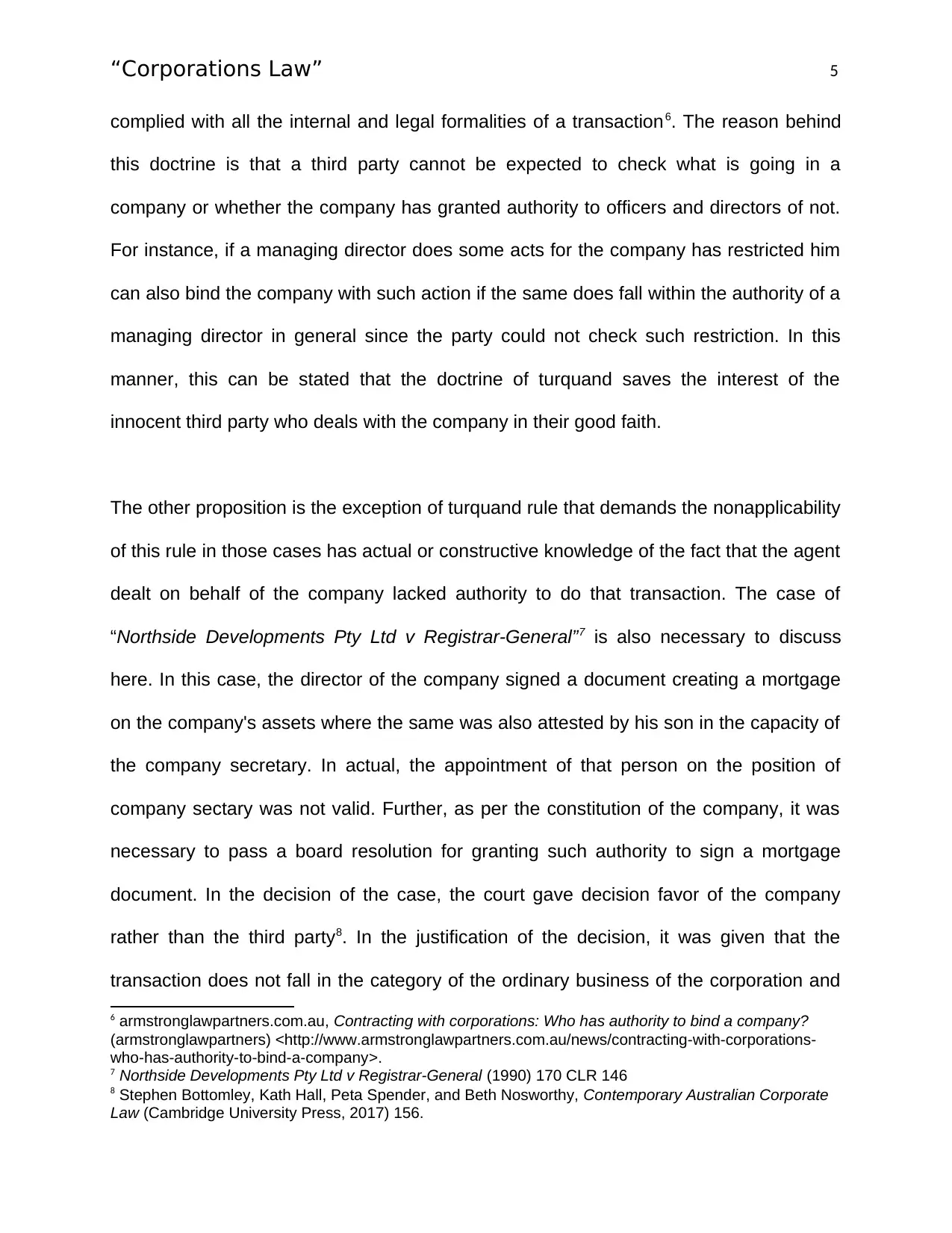
“Corporations Law” 5
complied with all the internal and legal formalities of a transaction6. The reason behind
this doctrine is that a third party cannot be expected to check what is going in a
company or whether the company has granted authority to officers and directors of not.
For instance, if a managing director does some acts for the company has restricted him
can also bind the company with such action if the same does fall within the authority of a
managing director in general since the party could not check such restriction. In this
manner, this can be stated that the doctrine of turquand saves the interest of the
innocent third party who deals with the company in their good faith.
The other proposition is the exception of turquand rule that demands the nonapplicability
of this rule in those cases has actual or constructive knowledge of the fact that the agent
dealt on behalf of the company lacked authority to do that transaction. The case of
“Northside Developments Pty Ltd v Registrar-General”7 is also necessary to discuss
here. In this case, the director of the company signed a document creating a mortgage
on the company's assets where the same was also attested by his son in the capacity of
the company secretary. In actual, the appointment of that person on the position of
company sectary was not valid. Further, as per the constitution of the company, it was
necessary to pass a board resolution for granting such authority to sign a mortgage
document. In the decision of the case, the court gave decision favor of the company
rather than the third party8. In the justification of the decision, it was given that the
transaction does not fall in the category of the ordinary business of the corporation and
6 armstronglawpartners.com.au, Contracting with corporations: Who has authority to bind a company?
(armstronglawpartners) <http://www.armstronglawpartners.com.au/news/contracting-with-corporations-
who-has-authority-to-bind-a-company>.
7 Northside Developments Pty Ltd v Registrar-General (1990) 170 CLR 146
8 Stephen Bottomley, Kath Hall, Peta Spender, and Beth Nosworthy, Contemporary Australian Corporate
Law (Cambridge University Press, 2017) 156.
complied with all the internal and legal formalities of a transaction6. The reason behind
this doctrine is that a third party cannot be expected to check what is going in a
company or whether the company has granted authority to officers and directors of not.
For instance, if a managing director does some acts for the company has restricted him
can also bind the company with such action if the same does fall within the authority of a
managing director in general since the party could not check such restriction. In this
manner, this can be stated that the doctrine of turquand saves the interest of the
innocent third party who deals with the company in their good faith.
The other proposition is the exception of turquand rule that demands the nonapplicability
of this rule in those cases has actual or constructive knowledge of the fact that the agent
dealt on behalf of the company lacked authority to do that transaction. The case of
“Northside Developments Pty Ltd v Registrar-General”7 is also necessary to discuss
here. In this case, the director of the company signed a document creating a mortgage
on the company's assets where the same was also attested by his son in the capacity of
the company secretary. In actual, the appointment of that person on the position of
company sectary was not valid. Further, as per the constitution of the company, it was
necessary to pass a board resolution for granting such authority to sign a mortgage
document. In the decision of the case, the court gave decision favor of the company
rather than the third party8. In the justification of the decision, it was given that the
transaction does not fall in the category of the ordinary business of the corporation and
6 armstronglawpartners.com.au, Contracting with corporations: Who has authority to bind a company?
(armstronglawpartners) <http://www.armstronglawpartners.com.au/news/contracting-with-corporations-
who-has-authority-to-bind-a-company>.
7 Northside Developments Pty Ltd v Registrar-General (1990) 170 CLR 146
8 Stephen Bottomley, Kath Hall, Peta Spender, and Beth Nosworthy, Contemporary Australian Corporate
Law (Cambridge University Press, 2017) 156.
⊘ This is a preview!⊘
Do you want full access?
Subscribe today to unlock all pages.

Trusted by 1+ million students worldwide
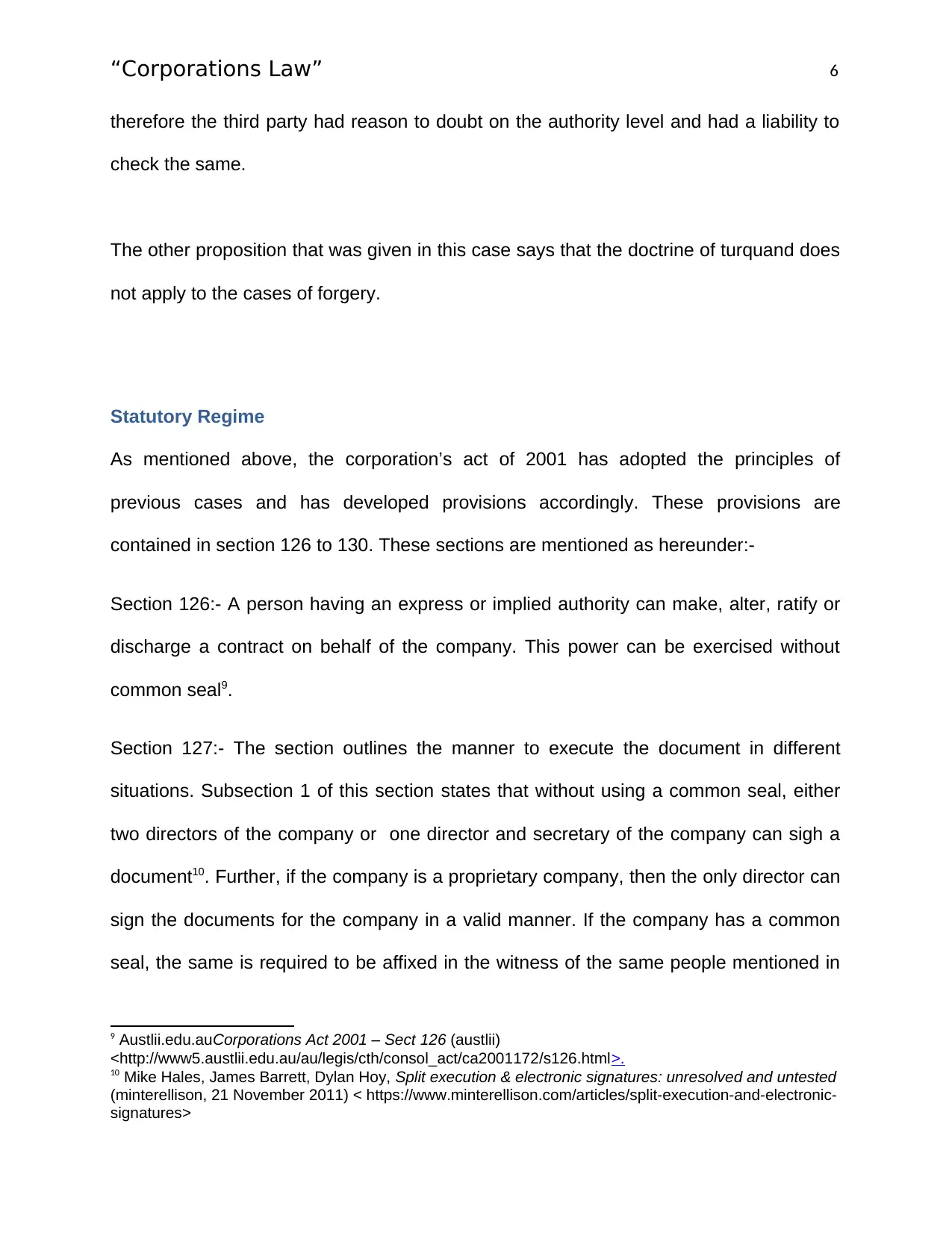
“Corporations Law” 6
therefore the third party had reason to doubt on the authority level and had a liability to
check the same.
The other proposition that was given in this case says that the doctrine of turquand does
not apply to the cases of forgery.
Statutory Regime
As mentioned above, the corporation’s act of 2001 has adopted the principles of
previous cases and has developed provisions accordingly. These provisions are
contained in section 126 to 130. These sections are mentioned as hereunder:-
Section 126:- A person having an express or implied authority can make, alter, ratify or
discharge a contract on behalf of the company. This power can be exercised without
common seal9.
Section 127:- The section outlines the manner to execute the document in different
situations. Subsection 1 of this section states that without using a common seal, either
two directors of the company or one director and secretary of the company can sigh a
document10. Further, if the company is a proprietary company, then the only director can
sign the documents for the company in a valid manner. If the company has a common
seal, the same is required to be affixed in the witness of the same people mentioned in
9 Austlii.edu.auCorporations Act 2001 – Sect 126 (austlii)
<http://www5.austlii.edu.au/au/legis/cth/consol_act/ca2001172/s126.html>.
10 Mike Hales, James Barrett, Dylan Hoy, Split execution & electronic signatures: unresolved and untested
(minterellison, 21 November 2011) < https://www.minterellison.com/articles/split-execution-and-electronic-
signatures>
therefore the third party had reason to doubt on the authority level and had a liability to
check the same.
The other proposition that was given in this case says that the doctrine of turquand does
not apply to the cases of forgery.
Statutory Regime
As mentioned above, the corporation’s act of 2001 has adopted the principles of
previous cases and has developed provisions accordingly. These provisions are
contained in section 126 to 130. These sections are mentioned as hereunder:-
Section 126:- A person having an express or implied authority can make, alter, ratify or
discharge a contract on behalf of the company. This power can be exercised without
common seal9.
Section 127:- The section outlines the manner to execute the document in different
situations. Subsection 1 of this section states that without using a common seal, either
two directors of the company or one director and secretary of the company can sigh a
document10. Further, if the company is a proprietary company, then the only director can
sign the documents for the company in a valid manner. If the company has a common
seal, the same is required to be affixed in the witness of the same people mentioned in
9 Austlii.edu.auCorporations Act 2001 – Sect 126 (austlii)
<http://www5.austlii.edu.au/au/legis/cth/consol_act/ca2001172/s126.html>.
10 Mike Hales, James Barrett, Dylan Hoy, Split execution & electronic signatures: unresolved and untested
(minterellison, 21 November 2011) < https://www.minterellison.com/articles/split-execution-and-electronic-
signatures>
Paraphrase This Document
Need a fresh take? Get an instant paraphrase of this document with our AI Paraphraser
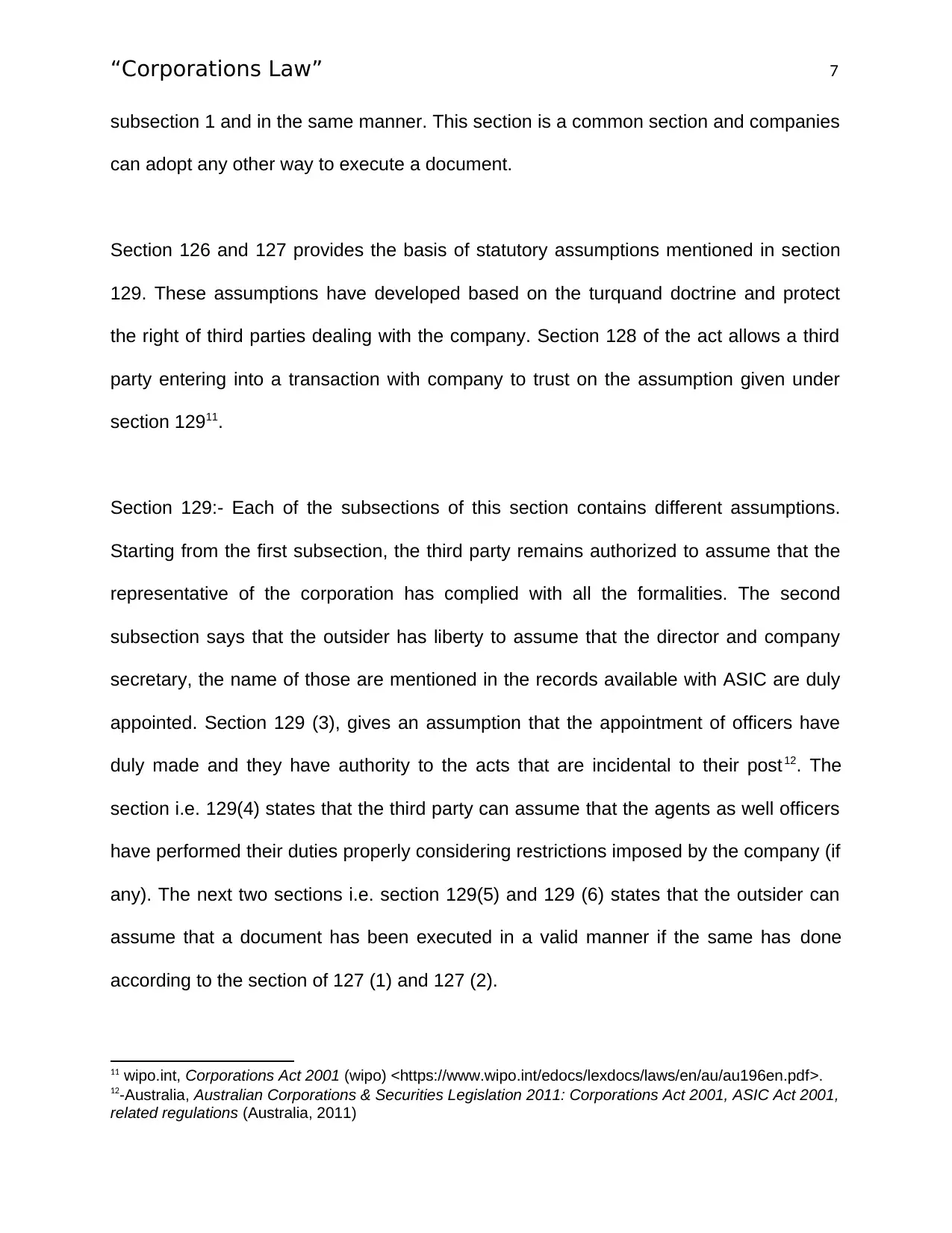
“Corporations Law” 7
subsection 1 and in the same manner. This section is a common section and companies
can adopt any other way to execute a document.
Section 126 and 127 provides the basis of statutory assumptions mentioned in section
129. These assumptions have developed based on the turquand doctrine and protect
the right of third parties dealing with the company. Section 128 of the act allows a third
party entering into a transaction with company to trust on the assumption given under
section 12911.
Section 129:- Each of the subsections of this section contains different assumptions.
Starting from the first subsection, the third party remains authorized to assume that the
representative of the corporation has complied with all the formalities. The second
subsection says that the outsider has liberty to assume that the director and company
secretary, the name of those are mentioned in the records available with ASIC are duly
appointed. Section 129 (3), gives an assumption that the appointment of officers have
duly made and they have authority to the acts that are incidental to their post12. The
section i.e. 129(4) states that the third party can assume that the agents as well officers
have performed their duties properly considering restrictions imposed by the company (if
any). The next two sections i.e. section 129(5) and 129 (6) states that the outsider can
assume that a document has been executed in a valid manner if the same has done
according to the section of 127 (1) and 127 (2).
11 wipo.int, Corporations Act 2001 (wipo) <https://www.wipo.int/edocs/lexdocs/laws/en/au/au196en.pdf>.
12-Australia, Australian Corporations & Securities Legislation 2011: Corporations Act 2001, ASIC Act 2001,
related regulations (Australia, 2011)
subsection 1 and in the same manner. This section is a common section and companies
can adopt any other way to execute a document.
Section 126 and 127 provides the basis of statutory assumptions mentioned in section
129. These assumptions have developed based on the turquand doctrine and protect
the right of third parties dealing with the company. Section 128 of the act allows a third
party entering into a transaction with company to trust on the assumption given under
section 12911.
Section 129:- Each of the subsections of this section contains different assumptions.
Starting from the first subsection, the third party remains authorized to assume that the
representative of the corporation has complied with all the formalities. The second
subsection says that the outsider has liberty to assume that the director and company
secretary, the name of those are mentioned in the records available with ASIC are duly
appointed. Section 129 (3), gives an assumption that the appointment of officers have
duly made and they have authority to the acts that are incidental to their post12. The
section i.e. 129(4) states that the third party can assume that the agents as well officers
have performed their duties properly considering restrictions imposed by the company (if
any). The next two sections i.e. section 129(5) and 129 (6) states that the outsider can
assume that a document has been executed in a valid manner if the same has done
according to the section of 127 (1) and 127 (2).
11 wipo.int, Corporations Act 2001 (wipo) <https://www.wipo.int/edocs/lexdocs/laws/en/au/au196en.pdf>.
12-Australia, Australian Corporations & Securities Legislation 2011: Corporations Act 2001, ASIC Act 2001,
related regulations (Australia, 2011)
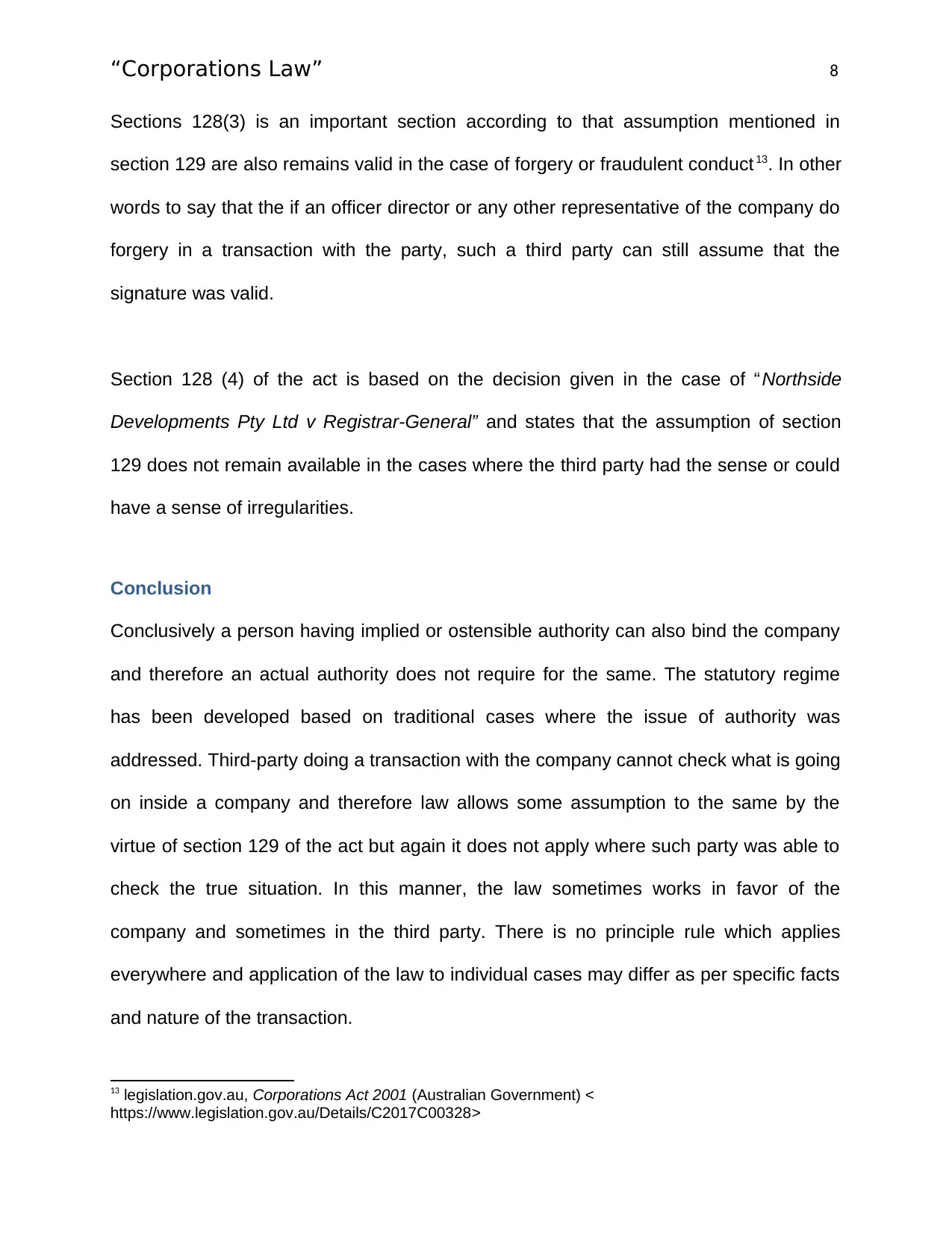
“Corporations Law” 8
Sections 128(3) is an important section according to that assumption mentioned in
section 129 are also remains valid in the case of forgery or fraudulent conduct 13. In other
words to say that the if an officer director or any other representative of the company do
forgery in a transaction with the party, such a third party can still assume that the
signature was valid.
Section 128 (4) of the act is based on the decision given in the case of “Northside
Developments Pty Ltd v Registrar-General” and states that the assumption of section
129 does not remain available in the cases where the third party had the sense or could
have a sense of irregularities.
Conclusion
Conclusively a person having implied or ostensible authority can also bind the company
and therefore an actual authority does not require for the same. The statutory regime
has been developed based on traditional cases where the issue of authority was
addressed. Third-party doing a transaction with the company cannot check what is going
on inside a company and therefore law allows some assumption to the same by the
virtue of section 129 of the act but again it does not apply where such party was able to
check the true situation. In this manner, the law sometimes works in favor of the
company and sometimes in the third party. There is no principle rule which applies
everywhere and application of the law to individual cases may differ as per specific facts
and nature of the transaction.
13 legislation.gov.au, Corporations Act 2001 (Australian Government) <
https://www.legislation.gov.au/Details/C2017C00328>
Sections 128(3) is an important section according to that assumption mentioned in
section 129 are also remains valid in the case of forgery or fraudulent conduct 13. In other
words to say that the if an officer director or any other representative of the company do
forgery in a transaction with the party, such a third party can still assume that the
signature was valid.
Section 128 (4) of the act is based on the decision given in the case of “Northside
Developments Pty Ltd v Registrar-General” and states that the assumption of section
129 does not remain available in the cases where the third party had the sense or could
have a sense of irregularities.
Conclusion
Conclusively a person having implied or ostensible authority can also bind the company
and therefore an actual authority does not require for the same. The statutory regime
has been developed based on traditional cases where the issue of authority was
addressed. Third-party doing a transaction with the company cannot check what is going
on inside a company and therefore law allows some assumption to the same by the
virtue of section 129 of the act but again it does not apply where such party was able to
check the true situation. In this manner, the law sometimes works in favor of the
company and sometimes in the third party. There is no principle rule which applies
everywhere and application of the law to individual cases may differ as per specific facts
and nature of the transaction.
13 legislation.gov.au, Corporations Act 2001 (Australian Government) <
https://www.legislation.gov.au/Details/C2017C00328>
⊘ This is a preview!⊘
Do you want full access?
Subscribe today to unlock all pages.

Trusted by 1+ million students worldwide
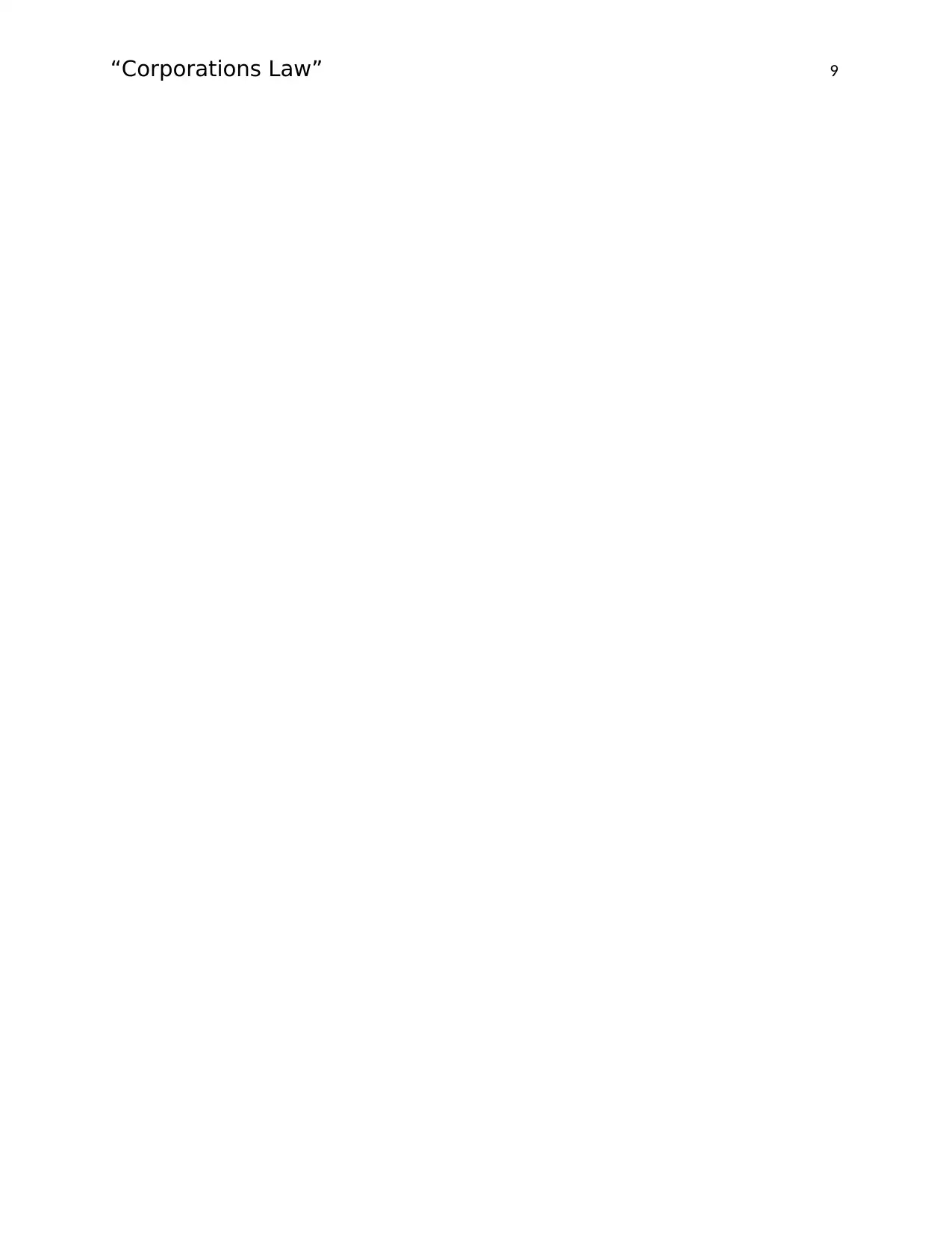
“Corporations Law” 9
Paraphrase This Document
Need a fresh take? Get an instant paraphrase of this document with our AI Paraphraser
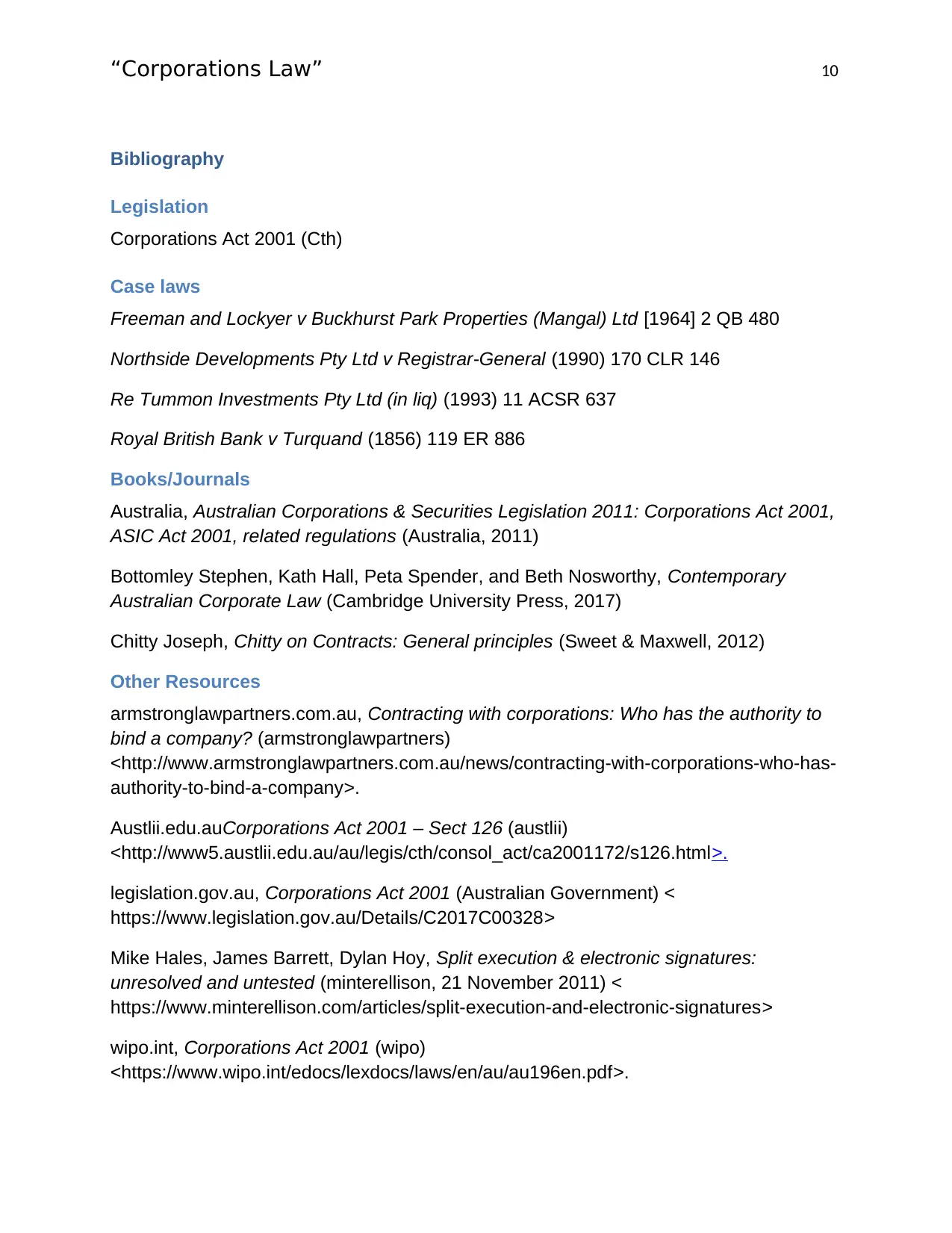
“Corporations Law” 10
Bibliography
Legislation
Corporations Act 2001 (Cth)
Case laws
Freeman and Lockyer v Buckhurst Park Properties (Mangal) Ltd [1964] 2 QB 480
Northside Developments Pty Ltd v Registrar-General (1990) 170 CLR 146
Re Tummon Investments Pty Ltd (in liq) (1993) 11 ACSR 637
Royal British Bank v Turquand (1856) 119 ER 886
Books/Journals
Australia, Australian Corporations & Securities Legislation 2011: Corporations Act 2001,
ASIC Act 2001, related regulations (Australia, 2011)
Bottomley Stephen, Kath Hall, Peta Spender, and Beth Nosworthy, Contemporary
Australian Corporate Law (Cambridge University Press, 2017)
Chitty Joseph, Chitty on Contracts: General principles (Sweet & Maxwell, 2012)
Other Resources
armstronglawpartners.com.au, Contracting with corporations: Who has the authority to
bind a company? (armstronglawpartners)
<http://www.armstronglawpartners.com.au/news/contracting-with-corporations-who-has-
authority-to-bind-a-company>.
Austlii.edu.auCorporations Act 2001 – Sect 126 (austlii)
<http://www5.austlii.edu.au/au/legis/cth/consol_act/ca2001172/s126.html>.
legislation.gov.au, Corporations Act 2001 (Australian Government) <
https://www.legislation.gov.au/Details/C2017C00328>
Mike Hales, James Barrett, Dylan Hoy, Split execution & electronic signatures:
unresolved and untested (minterellison, 21 November 2011) <
https://www.minterellison.com/articles/split-execution-and-electronic-signatures>
wipo.int, Corporations Act 2001 (wipo)
<https://www.wipo.int/edocs/lexdocs/laws/en/au/au196en.pdf>.
Bibliography
Legislation
Corporations Act 2001 (Cth)
Case laws
Freeman and Lockyer v Buckhurst Park Properties (Mangal) Ltd [1964] 2 QB 480
Northside Developments Pty Ltd v Registrar-General (1990) 170 CLR 146
Re Tummon Investments Pty Ltd (in liq) (1993) 11 ACSR 637
Royal British Bank v Turquand (1856) 119 ER 886
Books/Journals
Australia, Australian Corporations & Securities Legislation 2011: Corporations Act 2001,
ASIC Act 2001, related regulations (Australia, 2011)
Bottomley Stephen, Kath Hall, Peta Spender, and Beth Nosworthy, Contemporary
Australian Corporate Law (Cambridge University Press, 2017)
Chitty Joseph, Chitty on Contracts: General principles (Sweet & Maxwell, 2012)
Other Resources
armstronglawpartners.com.au, Contracting with corporations: Who has the authority to
bind a company? (armstronglawpartners)
<http://www.armstronglawpartners.com.au/news/contracting-with-corporations-who-has-
authority-to-bind-a-company>.
Austlii.edu.auCorporations Act 2001 – Sect 126 (austlii)
<http://www5.austlii.edu.au/au/legis/cth/consol_act/ca2001172/s126.html>.
legislation.gov.au, Corporations Act 2001 (Australian Government) <
https://www.legislation.gov.au/Details/C2017C00328>
Mike Hales, James Barrett, Dylan Hoy, Split execution & electronic signatures:
unresolved and untested (minterellison, 21 November 2011) <
https://www.minterellison.com/articles/split-execution-and-electronic-signatures>
wipo.int, Corporations Act 2001 (wipo)
<https://www.wipo.int/edocs/lexdocs/laws/en/au/au196en.pdf>.
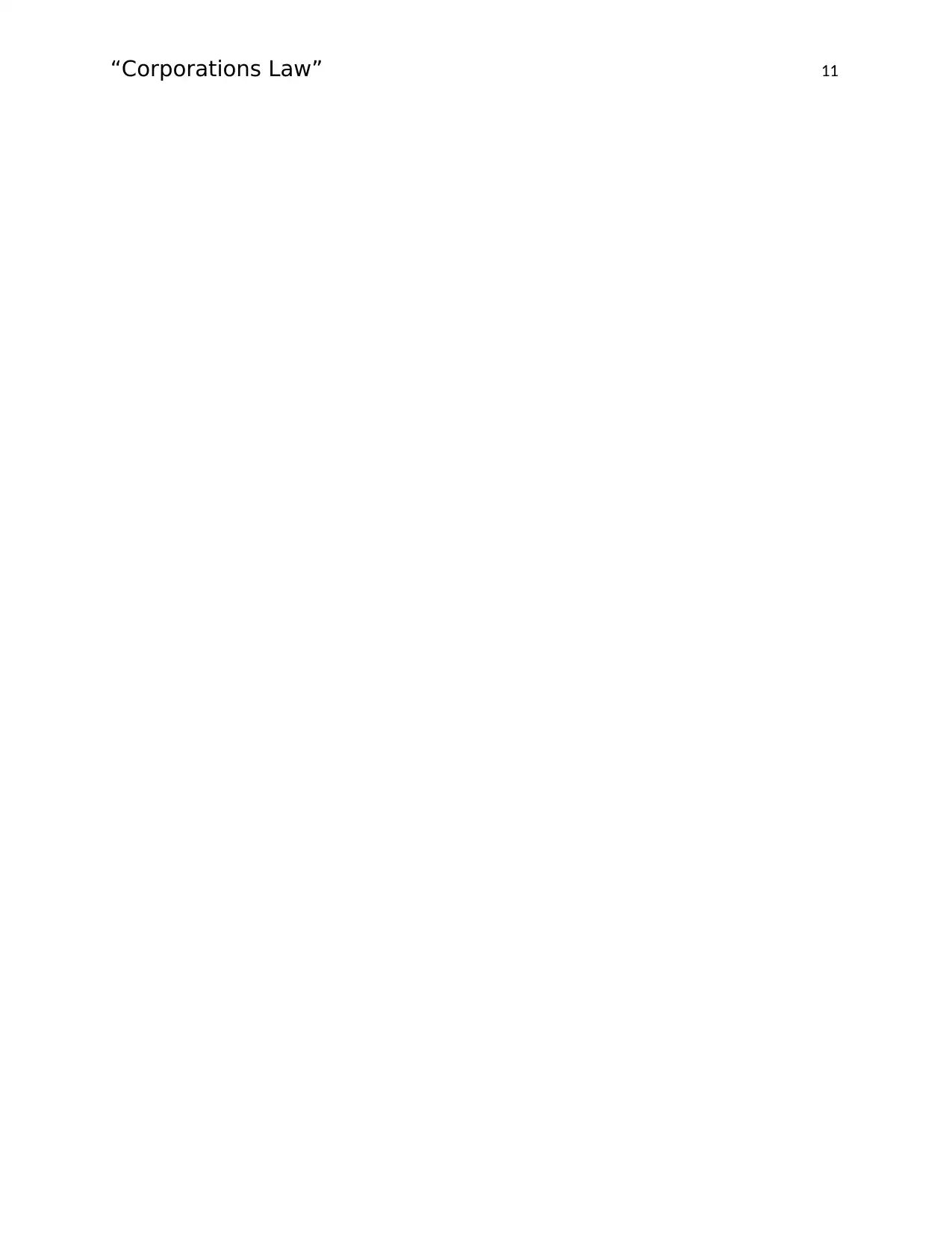
“Corporations Law” 11
⊘ This is a preview!⊘
Do you want full access?
Subscribe today to unlock all pages.

Trusted by 1+ million students worldwide
1 out of 12
Related Documents
Your All-in-One AI-Powered Toolkit for Academic Success.
+13062052269
info@desklib.com
Available 24*7 on WhatsApp / Email
![[object Object]](/_next/static/media/star-bottom.7253800d.svg)
Unlock your academic potential
Copyright © 2020–2026 A2Z Services. All Rights Reserved. Developed and managed by ZUCOL.





